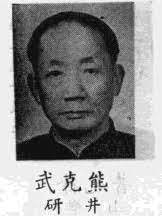Hsü Hsiang-ch'ien (1902-), Communist military commander, served under Chang Kuo-t'ao in the Hupeh-Honan-Anhwei soviet area (193132)' and in Szechwan and Sikang (1932-36). Wut'ai, Shansi, was the birthplace of Hsü Hsiang-ch'ien. Little is known about his background except that his father was a sheng-yuan. Hsü received a primary education in the Chinese classics and then enrolled […]






